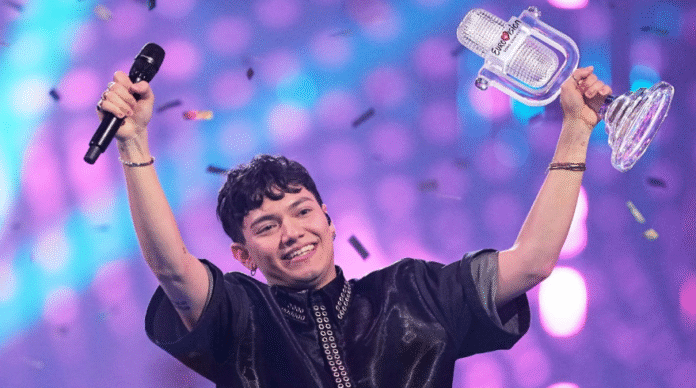By: Jessica A. Dennehy
The 69th edition of Eurovision, the annual glitter-soaked, pyrotechnic-filled fever dream poorly disguised as an international singing competition, has officially culminated in Basel, Switzerland. Although originally invented to unite a post–World War II Europe through music, the Eurovision Song Contest (ESC) has since evolved to become a near-sacred event, bringing in over 180 million viewers from more than 150 countries on an annual basis. This year, the competition was hosted in Basel, Switzerland, thanks to the nation’s 2024 victory with Nemo’s “The Code.” Unfolding between May 13 and 17 at the massive 12,000-seat St. Jakobshalle arena, a total of 37 nations—mostly European, with the exception of long-time participants Australia and Israel—vied for the 69th edition of the coveted crystal microphone trophy.
The format of this year’s competition, to long-time viewers, remains mostly familiar: two semi-finals, each with 15 countries competing, occur to determine 20 of the 26 slots in the Grand Final. The remaining six consist of the “Big Five”—France, Germany, Italy, Spain, and the UK—due to their role as the major financial contributors to the European Broadcasting Union. Additionally, as hosting the competition is a costly and time-consuming endeavor, the host country, Switzerland, automatically qualifies for the Grand Final.
The first semi-final was held on May 13, delivering on every expectation for yet another chaotic round of Eurovision. Among the ten acts qualifying for the Grand Final were Sweden’s KAJ with “Bara Bada Bastu”; Norway’s Kyle Alessandro with “Lighter”; and Albania’s Shkodra Elektronike with “Zjerm.” Rounding out the finalists were Iceland, the Netherlands, Poland, San Marino, Estonia, Portugal, and Ukraine.
Some shocking eliminations included Belgium and Cyprus—two countries that, according to the oddsmakers, were predicted to easily sail through to the Grand Final. Both Belgium’s Red Sebastian and Cyprus’ Theo Evans had qualifying odds in the 80s, backed by solid live performances and strong staging. Yet in a surprising twist, they fell to Portugal’s NAPA, a quiet indie group and their understated R&B song “Deslocado,” and San Marino’s Gabry Ponte and his EDM performance of “Tutta l’Italia.” Both were considered long shots, with Portugal having less than a 1% predicted chance of qualifying in polls. The second semi-final was held on May 15, continuing the preordained chaos with another sixteen countries battling it out for the remaining ten spots. Among those qualifying were Austria’s JJ and his opera-tech ballad “Wasted Love,” and Finland’s Erika Vikman with the innocently titled “ICH KOMME.”
Some performances I looked forward to as the Eurovision 2025 Grand Final kicked off included Austria’s JJ, who boldly performed entirely in black and white with his song “Wasted Love;” Latvia’s Tautumeitas with their folkloric “Bur Man Laimi;” Finland’s Erika Vikman with one of the fan favorites with her title track “ICH KOMME;” Italy’s Lucio Corsi and his harmonica-guitar-vocal solos in “Volevo Essere Un Duro;” Germany’s sibling duo Abor & Tynna follow with the high-energy “Baller;” and Switzerland’s showcasing of Zoë Më’s “Voyage.” My Eurovision excitement wouldn’t have been complete without looking forward to Sweden’s viral fan favorite KAJ and their performance of “Bara Bada Bastu,” a self-reflective parody song on the importance of sauna culture, as well as the banger that is Albania’s “Zjerm,” performed by the duo Shkodra Elektronike.
In the competition’s unforgettable conclusion, Austria just narrowly edged out Israel to win the Eurovision Song Contest 2025. After placing first from the jury vote with 258 points and 4th from the televote with 178, JJ the first winner in several years to do so with a score under 500 points. . His emotional ballad “Wasted Love” earned 436 points, just barely beating Israel’s 357 to first place. JJ, a 24-year-old countertenor trained at the Vienna State Opera, secured Austria’s first win since 2014 and the nation’s third win in Eurovision history. As he accepted the crystal microphone, a rather tearful JJ ended the night thanking the voters, urging the world to “spread more love.”

